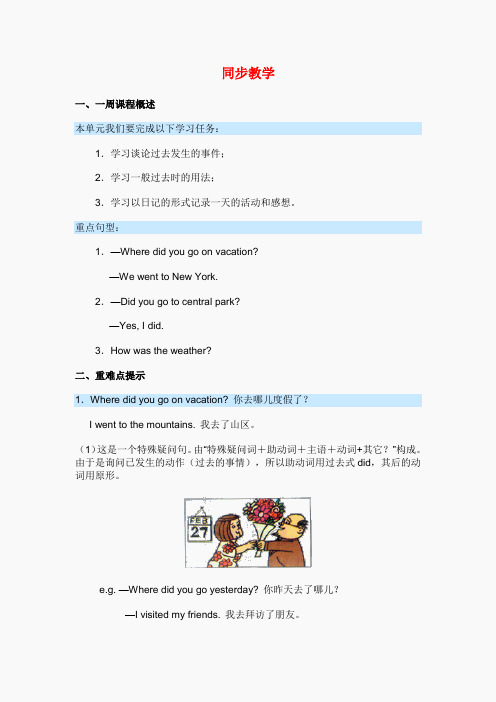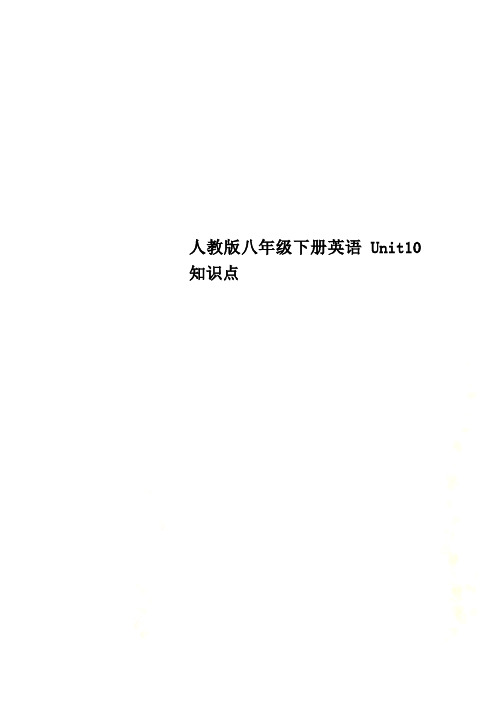Unit10 Did you know 你知道吗
- 格式:ppt
- 大小:1.29 MB
- 文档页数:17

同步教学一、一周课程概述本单元我们要完成以下学习任务:1.学习谈论过去发生的事件;2.学习一般过去时的用法;3.学习以日记的形式记录一天的活动和感想。
重点句型:1.—Where did you go on vacation?—We went to New York.2.—Did you go to central park?—Yes, I did.3.How was the weather?二、重难点提示1.Where did you go on vacation? 你去哪儿度假了?I went to the mountains. 我去了山区。
(1)这是一个特殊疑问句。
由“特殊疑问词+助动词+主语+动词+其它?”构成。
由于是询问已发生的动作(过去的事情),所以助动词用过去式did,其后的动词用原形。
e.g. —Where did you go yesterday? 你昨天去了哪儿?—I visited my friends. 我去拜访了朋友。
(2)与go to the mountains结构类似的词组还有:go to the beach 去海边go to summer camp 去夏令营go to New York 去纽约市go on vacation 去度假go to a trip 去旅行go to the movies 去看电影2.Did you go to central Park? 你去中心公园了吗?Yes, I did. 是的,去了。
这是一个一般疑问句,由助动词提问,回答也用助动词。
由于询问的是发生在过去的事,所以助动词用过去式did。
一般过去时的一般疑问句的句子结构:Did+主语+动词原形+其它+?回答:※在过去时态中,无论主语是第几人称,是单数还是复数,助动词一律用did:e.g.3.I stayed at home. 我呆在家里。
(1)stay可以是及物动词,也可以是不及物动词。

人教版八年级下册英语Unit10知识点Please keep a seat for me. = Please keep me a seat. 请给我留个座位。
2、in need 在困难时;在危难之中be in need of 需要……We are raising money for children in need. 我们在为贫困儿童募捐。
A friend in need is a friend indeed. 患难见真情。
After working for ten hours, she was in great need of rest. 工作十小时之后,她非常需要休息。
in短语:in danger 在危险中in trouble 在困境中in order 井然有序in hand 在手头;在控制中2、check 检查;审查check in (在旅馆、机场等)登记check out 察看;观察You should check your answer before you hand in your paper. 在你交卷子前你应该检查答案。
You should check in before the flight. 飞机起飞前你应该登记。
If you find something interesting, I will check it out. 如果你发现什么有趣的东西,我会去看一下。
3、junior high school 初中high school 高中4、no longer = not……any longer不再;不复This kind of skirt is no longer in fashion. = This kind of skirt is not in fashion any longer. 这种裙子不再流行。
He no longer lives in the city. = He doesn't live in the city any longer. 他不再住在这个城市了。

01词汇精讲1. upset(1) upset可作形容词,意为“难过的;失望的;沮丧的”。
例如:Don’t get so upset. 别那么沮丧。
After she died I felt very, very upset. 她去世之后,我非常非常难过。
(2) upset还可作动词,意为“使心烦意乱,使生气”。
例如:She warned me not to say anything to upset him.她警告我不要说任何让他不高兴的话。
Don’t upset yourself, Ida. 别自寻烦恼了,艾达。
(3) be upset with sb. 意为“生某人的气”。
例如:he is still upset with me. 她还在生我的气。
2. adviceadvice是不可数名词,意为“意见、建议、劝告、忠告”,不能与不定冠词a 连用。
例如:a piece of advice一条建议Let me give you some advice. 让我给你一些建议。
【拓展】(1) give sb. advice (on) 给……提(有关……)的建议。
例如:Can you give me some advice on how to learn English well?你能给我一些关于如何学好英语的建议吗?(2) take one’s advice 听从某人的建议 例如:I’ll take your advice, and do exercise every day.我会听从你的建议,每天锻炼身体。
(3) advise是advice的动词形式,意为“建议”,常用于advise sb. to do sth.的结构中。
例如: He advised me to read English every morning. 他建议我每天早晨读英语。
3. unless连词unless意为“除非……;如果不……”, 用来引导条件状语从句,引导条件句时,主要用于下列情况:(1)主句为肯定句。

Unit10 If you go to the party you’ll have a great time!知识点讲解一、If you do, the teachers won’t let you in.do, does, did等助动词可用来代替上文提到的动词,以避免重复例句:I don’t want to go shopping, but she does. 我不想去购物,但是她想去。
二、If you ask people to bring food, they’ll just bring potato clips and chocolate because they’ll be too lazy to cook. 如果你让大家带食物来,他们只会带炸薯条和巧克力,因为他们太懒了。
1、ask sb. to do sth.意为"要求某人做某事",其否定形式是"ask sb. not to do sth."要求某人不要做某事。
例句:I ask him to go to the movies. 我让他去电影院。
(2)too + adj./adv. + to do sth. 意为"太……而不能做某事",表否定意义。
【注意】too … to … 有时可与not ... enough to...进行同义转换。
例句:The math problem is too difficult for me to work out. 这道数学题太难,我解不出来。
例句:The boy is too young to join the army. = The boy is not old enough to join the army.这个男孩太小了还不能参军。
三、If you go to the party, you’ll have a great time. 如果你参加聚会,你将会玩得很开心。
1、本句是含有条件状语从句的复合句。

新课标英语七年级下册Unit10-12知识点汇总及练习1. would like“想要”,相当于want, 用法亦同want,但比want委婉。
1)want/would like sth. 想要某物I’d like some noodles2)want/would like to do sth. 想要做某事I’d like to play the piano 我想要弹钢琴。
3)want/would like sb. to do sth. 想要某人做某事I would like him to help me. 我想要他帮助我。
4)What would sb. like? 某人想要什么?What would they like? They would like some noodles.他们想要什么?他们想要一些面条。
5)What would sb. like to do? 某人想要做什么?What would they like to have? They would like to have some noodles.他们想要吃什么?他们想要吃一些面条。
6)would you like sth. 你想要某物吗?(委婉地询问对方的要求时的用语)肯定回答:Yes, please.否定回答:No, thanks.Would you like some more food? 你想再要些食物吗?Yes, please. 想要,谢谢。
No, thanks. 不用了,谢谢。
7) Would you like to do sth?你想要/愿意做某事吗?(向对方有礼貌地提出建议或邀请)肯定回答:Yes, I’d like/love to. 是的,我愿意。
否定回答:Sorry, + 原因。
Would you like to go shopping with us? 你想要/愿意和我们一起去购物吗?Yes, I’d like/love to. 是的,我愿意。

七年级上册英语Unit 10《Can you play the guitar》学问点【重点短语】1. play the guitar 弹吉彳也2. speak English 说英语3. join the art club参与艺术俱乐部4.play chess 下象棋5. be good with... 对…相处的好6.help sb. with sth,在某件事上帮助某人7.sing or dance唱歌或跳舞8. call sb. at... 用号码打给某人9. rock bank摇滚乐队10.school show 学校公演11. Chinese kung fu 中国功夫12. a little 一点13. E-mail address电子邮件地址【经典句型】1.Can you play the guitar? 你会弹吉他吗?Yes, I can. 是的,我会。
No, I不,我不会。
2.I want to join the music club. 我想参加音乐俱乐部。
3.What club do you want to join?你想参加什么俱乐部?4.What can you do? 你会做什么?5.Tom can play the guitar but he carTt play it very汤姆会弹吉他,但是well.6.Are you good with kids?你和孩子们相处得好吗?7.We need help for our Beidaihe School Trip.我们的北戴河之旅需要帮助。
8.Can you help with sports?你能在体育方面帮助吗?9.Musicians wanted for school music festival.学校音乐节招收音乐人。
10.Can you play the piano, the trumpet, the drums, or the guitar?你会弹电冈琴、吹喇叭、打鼓还是会弹吉他?11.Please call Zhang Heng at 622-6033. 请拨打622-6033 找张衡。
Unit 10 If you go to the party, you’ll have a great time!第一课时(Section A 1a-1c)一、自主学习Ⅰ.仔细观察下列例句,然后总结归纳关于if 引导的条件状语从句的用法。
1.If it rains next Sunday, we won’t go for a picnic.如果下周日下雨,我们就不去野餐了。
2.If you go to the party, you will meet Uncle Zhang.如果你去参加聚会,就会遇到张叔叔。
3.I’ll ask the teacher for help if I don’t understand.如果我有不懂的知识,就会向老师求助。
4.We’ll plant trees in the mountains if it is fine tomorrow.如果明天天气睛朗,我们就要去山上植树。
5.Put up your hand if you have any questions to ask.如果你有问题,请举手。
6.If I get there early, I can see the doctor soon.如果我早到这儿,我就能很快看病。
「结论」1.从以上例句,可知if是_______词,它连接了一个条件状语从句,表示假如有从句的动作发生,就会有主句的动作发生。
2.通常情况下,主句用一般将来时,if引导的条件状语从句要用_________时态;3.由if 引导的条件状语从句既可以放在主句之______,如例句1、2、6;也可以放在主句之_______,如例句3、4、54.从句如果位于主句之前时,常用_________将其与主句隔开,如例句1、2、65.若主句是祈使句,if引导的条件状语从句仍用____________时态。
如例句_______;6.主句不一定总是一般将来时,有时也会出现“_________动词+动词原形”的情况,如例句_________,从句总是___________时态。
Do you know 跟DID YOU KNOW分别在什么场合下使用?举个例子 - 搜1、问以前知不知道时用did you know。
2、问对方现在知不知道用Do you know。
一、did you know读音:英 [dɪd ju nəʊ] 美 [dɪd jə noʊ]释义:你知道吗。
语法:know的基本意思是“知道”“认识”“听说”,指直接了解某事物,也可表示“领会,懂得”,指通过体验或传授而获得知识。
二、Do you know读音:英[duː ju nəʊ] 美[duː jə noʊ]释义:你知道吗。
语法:know既可用作不及物动词,也可用作及物动词。
用作及物动词作“知道,懂得”解时,可接表示事物的名词、代词、带疑问词的动词不定式、that或疑问词引导的从句作宾语。
同类词组:Does he know读音:英 [dʌz hi nəʊ] 美 [dʌz hi nəʊ]释义:他知道吗?语法:在对话回答语中,如know的宾语表示的是整个事实(如that-clause),则宾语可省略,如know的宾语是一个具体事物,则通常以it代替之。
例句:Little does he know that the police are about to arrest him.他一点也不知道,警察就要逮捕他了。
高中英语教案范文供参考的范例Module 1 Unit 2 Heroes Lesson 1 Modern Heroes说课教案(一)教学内容1. 本课是Unit 2 heroes Lesson 1 Modern Heroes 的第一课时。
本单元分别介绍了National hero, History makers,Sports stars 和 Superhero。
这几篇文章的主题都是hero,但涉及的领域不同,它们融会贯通,承上启下,融为一体。
2. 本课是介绍National Hero,是学生比较熟悉和感兴趣的话题,前部分需要介绍杨利伟和神州五号,让学生掌握有关词汇;后一部分是介绍杨利伟乘坐神州五号宇宙飞船遨游太空的情况。
初三英语Unit10 When was it invented知识精讲【同步教育信息】一. 本周教学内容:Unit 10 When was it invented?[学习过程]一. 学习目的〔Language Goal〕1. Talk about the history of inventions 议论创造的历史2. Review the Passive Voice 复习被动语态3. Cultiva te Students’ creativity. 培养学生的创造力二. 语言构造:〔Language Structures〕1. the Passive Voice (be + p.p)被动语态2. “be used for doing〞构造三. 目的语言〔Target language〕1. When was the car invented? 汽车是何时被创造的?It was invented in 1885. 汽车被创造于1885年。
2. When were electric slippers invented?电拖鞋是何时被创造的?They were invented last year.它们是去年被创造的。
3. Who were they invented by?它们是被谁创造的?They were invented by Julie Thompson.它们是被Julie Thompson创造的。
4. What are they used for?它们被用来做什么?They are used for seeing in the dark.它们用来在黑暗里照亮。
四. 重点词组〔Key phrases〕1. be used for 用来做…2. light bulb电灯泡3. microwave oven微波炉4. by mistake错误地5. by accident 偶尔,意外6. in the end 最后,终于7. according to 根据,按照8. fall into 落入,陷入9. in this way 这样10. flying disk 飞碟11. be invented by 由…创造12. over three thousand years三千多年13. boil water 烧水14. boiling water开水15. decide to do sth 决定做…16. sprinkle …on …往…撒/洒…17. the history of chips薯片的历史18. not salty enough不够咸19. in the dark在黑暗中20. the style of shoes 鞋的款式五. 语法重点〔Grammar Focus〕the Passive Voice 〔被动语态〕1. 语态是表示主语与谓语的关系的。